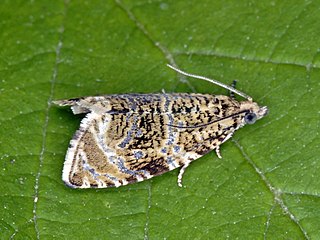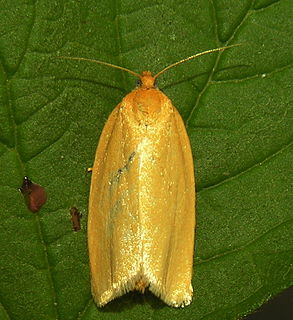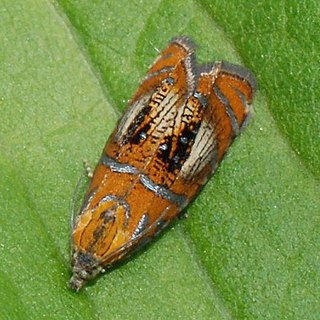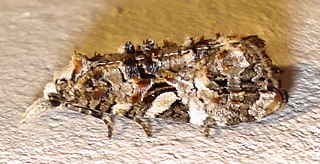
Cydia is a large genus of tortrix moths, belonging to the tribe Grapholitini of subfamily Olethreutinae. Its distinctness from and delimitation versus the tribe's type genus Grapholita requires further study.

Enarmonia formosana, the cherrybark tortrix or cherry-bark moth, is a small but colorful moth species of the family Tortricidae. It is native to all of northern and western Europe, ranging south to the Maghreb. North of the Alps its range extends eastwards to Siberia and Kazakhstan. Possibly and most likely introduced populations are found in Asia Minor and North America, respectively.

Olethreutes arcuella, the arched marble, is a colorful small moth species of the family Tortricidae.

Crocidosema plebejana, the cotton tipworm, is a tortrix moth, belonging to tribe Eucosmini of subfamily Olethreutinae. It is found today all over the subtropical and tropical regions of the world and even occurs on many oceanic islands – in Polynesia and Saint Helena for example – but has probably been accidentally introduced to much of its current range by humans. In addition, it is also found in some cooler regions, e.g. in Europe except in the east and north; this is probably also not natural, as it was, for example, not recorded in the British Isles before 1900.

Syricoris lacunana, the dark strawberry tortrix, is a small moth species of the family Tortricidae. It is found in the Palearctic realm.

Aphelia is a genus of tortrix moths in tribe Archipini.

Cnephasia asseclana, the flax tortrix, is a moth of the family Tortricidae. It is found all over Europe.

Celypha aurofasciana is a small moth species of the family Tortricidae. It is native to Europe and the Palearctic but occurs in some other places as an introduced species.

Epinotia is a very large genus of tortrix moths. It belongs to the tribe Eucosmini of subfamily Olethreutinae.

Grapholita is a large genus of tortrix moths. It belongs to subfamily Olethreutinae, and therein to the tribe Grapholitini, of which it is the type genus.

Olethreutes is a large genus of tortrix moths. It is the type genus of its tribe (Olethreutini) and subfamily (Olethreutinae).

The tortrix moth, genus Pammene, belongs to the tribe Grapholitini of the subfamily Olethreutinae.

Acleris is a genus of moths belonging to the subfamily Tortricinae of the family Tortricidae. As of 2007, about 241 species were known.

Cnephasia is a genus of tortrix moths. It belongs to the subfamily Tortricinae and therein to the tribe Cnephasiini, of which it is the type genus.

Eana is a genus of tortrix moths. It belongs to the tribe Cnephasiini of subfamily Tortricinae.

Cochylidia is a genus of moths belonging to the family Tortricidae.

Phtheochroa is a large genus of tortrix moths. It belongs to the tribe Cochylini of subfamily Tortricinae.

Cydia duplicana is a small moth of the family Tortricidae. It is found in all across Europe, extending barely into Asia in the Transcaucasus, Turkestan and Kazakhstan.

Cydia illutana is a small moth of the family Tortricidae. It is found from western and central Europe, north to Scandinavia and east to Russia (Siberia).



















